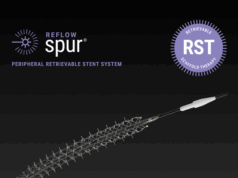
The Absorb bioresorbable vascular scaffold (BVS; Abbott Vascular) can be used for the treatment of chronic limb-threatening ischaemia (CLTI) patients in infrapopliteal arteries with no safety concerns and favourable patency, rates of reinterventions, and amputations at a mid-term follow-up of two years. This was the conclusion presented by Steven Kum (Changi General Hospital, Singapore) during a late-breaking data session at this year’s Vascular Interventional Advances annual meeting (VIVA 2020; 6–8 November, virtual).
CLTI continues to plague many patients worldwide and is associated with complex comorbidities, poor vessel patency, and major lower extremity amputations. Plain balloon angioplasty is still the mainstay of treatment although metallic drug-eluting stents have shown promise. This multicentre pooled analysis investigates the mid-term outcomes of a drug-eluting BVS in the treatment of CLTI.
Consecutive patients with de novo infrapopliteal lesions were treated with Absorb BVS at three centres (in Singapore, Chicago, and Sydney) between August 2012 and May 2017. Restenosis was defined on colour-flow Doppler examination with a sensitive peak systolic velocity (PSV) ratio >2 or PSV >2m/s (equivalent to >50% stenosis).
A total of 121 patients with 161 lesions were treated with 189 Absorb BVS in 126 limbs.
The mean age of the patients was 73 years. Fifty-seven per cent of patients had diabetes and 75% had tissue loss. Of the 161 lesions treated, 63% were calcified and 22% were occlusions. Median lesion length was 21mm (4–88mm). Successful deployment was achieved with all scaffolds.
Kum reported that there was no mortality in 30 days. Primary patency was 90.3% and 86.6%, and freedom from clinically driven target lesion revascularisation (CD-TLR) was 97.2% and 96.6% at one and two years, respectively. Major amputation occurred in 1.6% of the limbs and overall survival was 85.8% at two years.
Looking forward, Kum announced that the current LIFE-BTK randomised multicentre trial with the novel Esprit BTK drug-eluting resorbable scaffold (DRS) will help further assess the significance of these findings.










